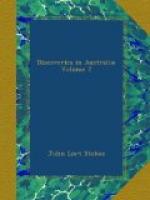I cannot, however, refrain from alluding to another point in connection with this matter; namely, that when I visited South Australia, all instruction was communicated in the native language. My attention had already been drawn to the subject on visiting Tahiti, in 1835, when I perceived with regret, that the missionaries, instead of endeavouring to introduce the English tongue, persisted in imparting instruction in a kind of corrupted dialect, of which the words were for the most part native, whilst the syntax and construction were in exact conformity with our own; the observation of the same circumstance at New Zealand, had further induced me to reflect on the subject. How much more prudent would it have been to introduce, at once, the language of Great Britain into the islands of the Pacific; as, judging from every indication, it must ultimately prevail over the vast variety of primitive and imperfect dialects now spoken; and which serve as barriers between the various tribes. That the same mistake should have been made in South Australia was the more remarkable, as public opinion seems to run completely counter to it. It appears evident indeed, that if the object was to benefit and civilize the aboriginal inhabitant, the right course to take, was to give him an instrument which he could employ to enlarge his mind and extend his experience. It was wrong to expect that much good could be done by confining him within the sphere in which his thoughts had been accustomed to move; or at any rate, to limit the expansion of his knowledge, within the bounds of a dialect which was only imperfectly understood by the masters who taught it. I am aware that the excellent men who adopted this plan, were fearful of allowing the natives to acquire a facility of communicating with the vicious part of the white population; but had they taken a more enlarged view, and considered the absolute impossibility of preventing a certain amount of intercourse—had they had more confidence in the better part of their own race, and reflected on the immense advantage which the inquisitive savage would derive from being enabled to put questions to men who could enlighten him by their answers, they would more speedily have effected their benevolent intentions. I am of opinion that no surer method of raising the Australian in the scale of civilization could have been devised, than to put him in possession of the English language; and I am glad to hear that the opinion I so early formed has at length been partially acted upon. The natives will soon be open to an engagement on board a vessel, and may expect to emulate the New Zealanders, some of whom have risen to be mates; and to acquire the information and experience of which they stand so much in need. Whereas, were their knowledge confined to their own imperfect dialect, not only would they be unable to extend their acquaintance with other parts of the world, and with the arts of civilization, but they would remain, as




